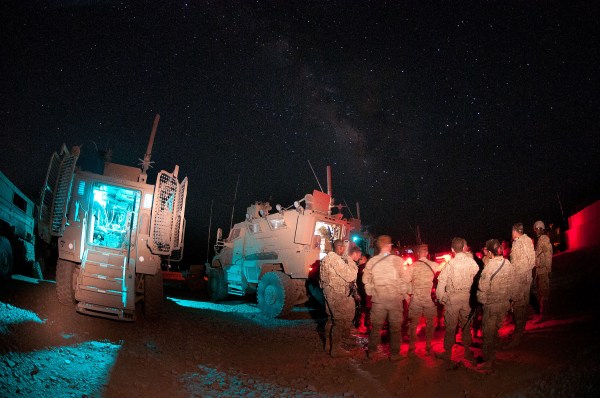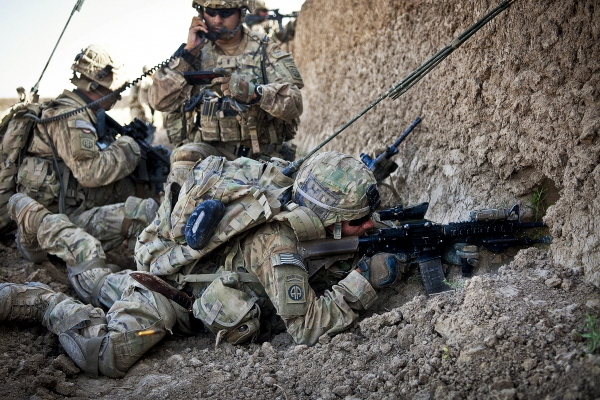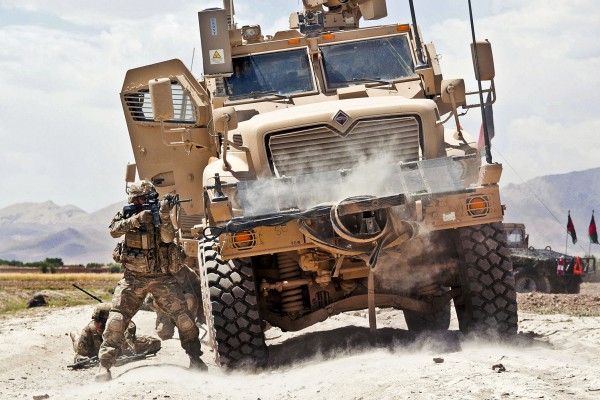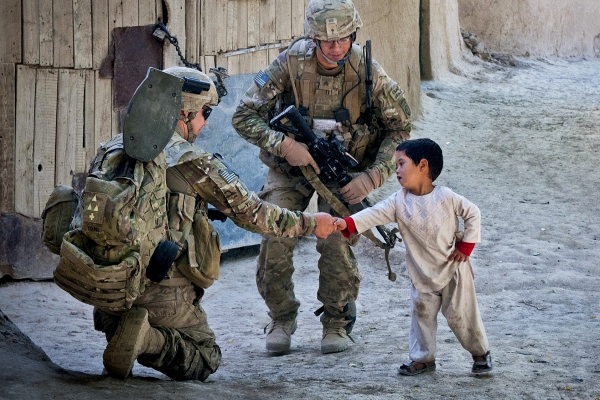MacLeod in a self-portrait he took while helping to secure a helicopter landing zone during an air assault mission June 4 in Ghazni Province.
Battleland has been impressed by the photographic chops of Army Sergeant Mike MacLeod since his images began showing up in the Pentagon’s daily photo file several months ago. We’ve posted many of them on this site. It’s gotten to the point that when we see a good picture from Afghanistan, we know it’s “a MacLeod.” So we asked him to write about his work:
GHAZNI PROVINCE, Afghanistan – When people learn that I am an Army photojournalist, the first question they often ask is, how do I know when to shoot with my camera and when to shoot with my rifle?
It’s a good question, and not one with an intuitive answer for those who have never been shot at by machine guns and rocket-propelled grenades.

Army photo / Sgt. Michael J. MacLeod
I am what the Army calls a print journalist, a “forty-six quebec” in occupational lingo. Officially, I write articles and take pictures to educate and inform soldiers and their families so as to maximize their combat readiness for my commander.
Day-to-day, however, I serve soldiers. I strive to make them and their families proud of their skills, proud of their sacrifices, and proud to wear the uniform. All good things should flow from there.

Army photo / Sgt. Michael J. MacLeod
Here in Afghanistan’s Ghazni Province where my unit, the 82nd Airborne Division’s 1st Brigade Combat Team, is deployed, there are plenty of opportunities to do this. Our mission is to help Afghan soldiers and policemen eradicate the insurgent presence along Afghanistan’s most important and dangerous road, Highway 1, which connects the two major cities of Kandahar and Kabul.
Since March, I have covered our paratroopers and their Afghan partners conducting air assault missions, foot patrols, artillery and mortar “fire” missions, resupply missions, meetings with village elders, making reparations for damaged infrastructure, clearing roads of mines, launching surveillance drones, training Afghan forces, and directly engaging the enemy.

Army photo / Sgt. Michael A. MacLeod
In the last 50 days I’ve been in 14 firefights. I have also photographed the memorial ceremonies of eight of our fallen soldiers so that their families might see the dignity with which the Army treats its war dead and the impact of the loss on a soldier’s mates.
Being in a firefight is like swimming through the essence of chaos. It can be exhilarating and it can be terrifying. It is often both.

Army photo / Sgt. Michael J. MacLeod
A soldier doesn’t just rely on his training, he exists by it. It is often his only tool to abide the fear.
As a photographer, what do I do when incoming rounds start snapping the air? I have one golden rule: if I can see who is firing, I fire back with my M4 carbine. I serve soldiers, and foremost, they must live. If I cannot see the enemy, I use my camera.
During my last major engagement, I shot 29 bullets and 212 images.

army photo / sgt. michael j. macleod
I would like to fire more bullets because I am human and I see what the Taliban has done to this beautiful country. Buses of civilians blown apart by homemade explosives, young girls chastized with acid to the face, beheadings, political assassinations, wholesale intimidation of a society, the enslavement of an entire generation to ignorance by school closings – all have occurred here since we arrived in Ghazni.
A deployed soldier’s first lesson is that some people just need to die.
I resist, though, because combat is my best opportunity to document what our paratroopers do. You can’t kill the enemies of freedom by hiding behind a wall.
You must expose yourself to their gunfire and RPGs to first find them among the grape huts, kalat walls and orchards, then take aim, then pull the trigger.
It can take what seems like a very long time with so much metal racing past your head. It only takes one fragment to destroy the lives of the family you left in America.
This is what soldiers do. This is what they risk. Bravery is not easy to show in pictures, but that is my target when I drop my weapon and lift my camera.


